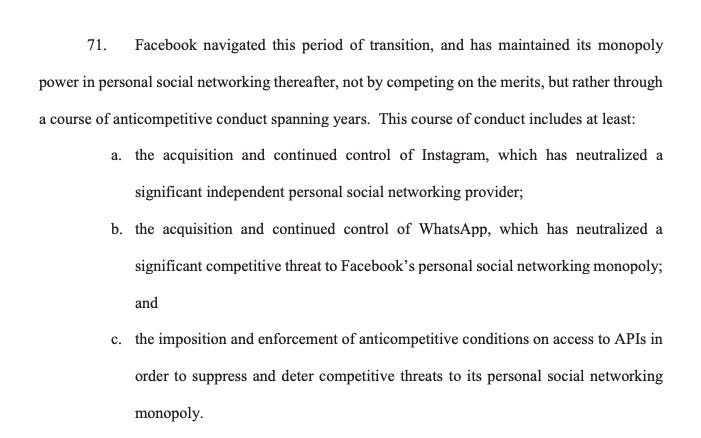😓 Facebook blue
harm for whom +how?
🤷♀️ Sometimes it seems weird that Facebook has such a loyal user base and a surging stock when we know the platform consistently manipulates the very same populations that it promises to connect. Am I right, ladies?
🗞️ I wrote about the FTC’s Complaint for Injunctive and other Equitable Relief in the Globe and Mail. You can read it here. Yes, I 💯 need a new headshot.
There is no doubt that people around the world are being harmed by this digital product that is offered for free.
This antitrust suit is best understood as an intervention to take on the global consequences of Facebook’s monopoly and reclaim our democracies using traditional policy tools.
There is a dimension of the suit that I didn’t quite have the word count to explore in the Globe and Mail piece, and that’s the specifics around how they unevenly limited developer access to their APIs. I am most interested in the idea that this is “okay” because “other companies do it.”
Below some excerpts from the suit (which is worth reading).
That Facebook maintained and enforced anti-competitive conditions for platform access to deter competitive threats to its personal social networking monopoly.
*RE: purchasing the surveillance company Onavo in 2013.
75. By acquiring Onavo, Facebook obtained control of data that it used to track the growth and popularity of other apps, with an eye towards identifying competitive threads for acquisition or for targeting under its anticompetitive platform policies. As a December 2013 internal slide deck noted: “With our acquisition of Onavo, we now have insight into the most popular apps. We should use that to also help us make strategic acquisitions.” Facebook also used Onavo data to generate internal “Early Bird” reports for Facebook executives, which focused on “apps that are gaining prominence in the mobile eco-system in a rate or manner which makes them stand out.” Facebook shut down Onavo in 2019 following public scrutiny; however, it continues to track and evaluate potential competitive threats using other data.
77. Likewise, Facebook’s imposition of anticompetitive conditions on APIs— punishing and suppressing some promising threats (e.g., Path, Circle, and various messaging apps) and preventing and deterring others from even becoming threats in the first place—continued until recently suspended in the glare of attention from governments and regulators around the globe. Facebook will resume those policies or equivalent measures unless enjoined from doing so.
136. Facebook uses this power to deter and suppress competitive threats to its personal social networking monopoly. In particular, to protect its personal social networking monopoly, Facebook adopted conditional dealing policies that limited how third-party apps could use Facebook Platform. Specifically, between 2011 and 2018, Facebook made Facebook Platform, including certain commercially significant APIs, available to developers only on the condition that their apps neither competed with Facebook (including, at relevant times, by “replicating core functionality” of Facebook Blue or Facebook Messenger), nor promoted competitors. Facebook punished apps that violated these conditions by cutting off their use of commercially significant APIs, hindering their ability to develop into stronger competitive threats to Facebook Blue.
The filing goes on to show that Facebook’s enforcement of its anticompetitive conditions deterred emerging threats, and summarized that their actions to enforce these policies by cutting off API access were generally directed against apps in three groups:
personal social networking
promising apps w/ some social functionality
promising apps that offered mobile messaging services.
I was struck by this reasoning from Zuckerberg regarding the social media platforms presumed obligation to allow equitable access to Facebook APIs - “LinkedIn, The New York Times, Pinterest and Uber, to name a few, all have similar policies.”
The finger pointing! If/as this is a common practice, it’s worth also looking into from a competition standpoint. Flagging for follow up.
Vass Bednar is the Executive Director of McMaster University’s new Master of Public Policy in Digital Society Program.












